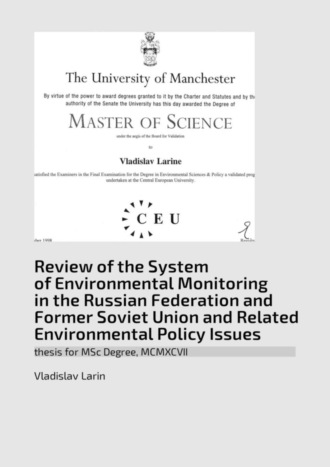
Полная версия
Review of the System of Environmental Monitoring in the Russian Federation and Former Soviet Union and Related Environmental Policy Issues. Thesis for MSc Degree, MCMXCVII
All listed limitations in reliability of collected data, as a rule, are minimised by the implementation of unified methods, used in large information frameworks. That is why it is possible to speak about good quality of environmental information collected by different official organisations. Anyway, the Russian Federation and NIS have no alternative systems for collection of environmental information and researchers are forced to use official data.
2.2.3. New participants in the process collecting environmental information
In the last years small organisations and are trying to compete in this sphere with state monopolists. For years analysis of the environment in the USSR was restricted for independent experts. All data on the state of the environment was confidential and any unauthorised activity around this problem was considered as illegal and prohibited. Citizens and independent researchers did not have access to official data and could not collect their own data about the state of environment (independent researchers are professionals and experts in the field of environmental problems which are not staff of governmental bodies – researchers, scientific journalists and writers, chemists, biologists and geographers, experts of NGOs, etc.).
This situation started to change during the «perestroyka» times when «ecological glasnost» become effective weapon for the new political reformers. Legal regulations in this sphere were not formed and holders of environmental information did not make it available for public use. It was the time when independent environmentalists wrote serious articles and books on the basis of newspaper publications.
At that time with the growing public concern about environmental problems small private enterprises started to appear, offering services for of air, water and soil analyses. Under the conditions of information vacuum this activity was successful. But the reliability of the information obtained was not better (and very frequently ever worse) than the data from official organisations. This was a result of poor equipment; bad training of the staff; absence of knowledge about existing methods for analysis of environmental samples; willingness to present not real, but expected information.
Data on the state of the environment at that time was collected by the following bodies, besides official organisations:
Конец ознакомительного фрагмента.
Текст предоставлен ООО «ЛитРес».
Прочитайте эту книгу целиком, купив полную легальную версию на ЛитРес.
Безопасно оплатить книгу можно банковской картой Visa, MasterCard, Maestro, со счета мобильного телефона, с платежного терминала, в салоне МТС или Связной, через PayPal, WebMoney, Яндекс.Деньги, QIWI Кошелек, бонусными картами или другим удобным Вам способом.
Примечания
1
Names of the organisations referred their status for the 1996 (Larin, 1996);

